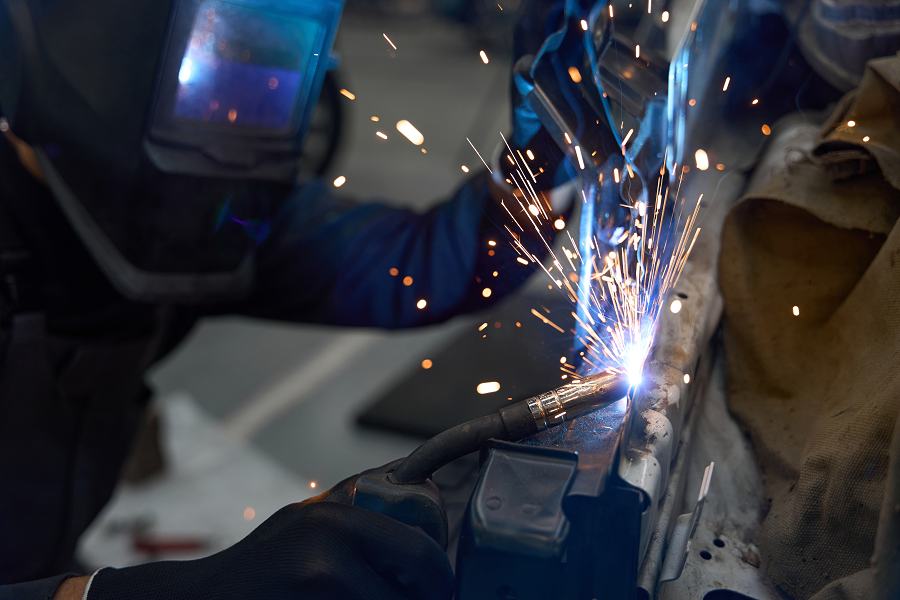Construction today requires evolving talent to meet the changing demands and technological advancements of our industry. In 2023, the duties and responsibilities within fabrication operations offer many career opportunities for construction professionals. A fabrication shop and its operations now encompasses various roles collaborating seamlessly to deliver high-quality industry-wide solutions.
Each team member, from skilled fabricators and welders to design engineers and project managers, is crucial in the efficient and precise fabrication process. These professionals are responsible for interpreting design plans, creating accurate fabrication drawings, assembling components, and ensuring compliance with industry standards. Additionally, they prioritize safety measures, embrace sustainable practices, and utilize cutting-edge technologies to optimize efficiency and streamline operations.
As fabrication operations continue to evolve, these dedicated individuals work together to deliver exceptional results that meet the ever-increasing demands of clients in the dynamic field of construction fabrication.
Modern fabrication requires diverse roles and skills.
Running a fabrication shop demands diverse roles to guarantee a smooth process and efficient delivery. These roles encompass various responsibilities that contribute to the overall success of the fabrication shop. From the shop manager overseeing the daily functions to the project manager coordinating projects, each role is vital in maintaining effective production, schedule adherence, and budget management. Design engineers collaborate with architects and engineers to translate design plans into fabrication drawings, while fabricators and welders meticulously assemble and shape components. Estimators analyze project requirements and create accurate cost estimates, while quality control inspectors ensure that the final products meet the highest standards.
Additionally, logistics coordinators manage the procurement and delivery of materials, while health and safety officers prioritize a safe work environment. This diverse team of professionals collectively delivers outstanding solutions while upholding industry regulations and delivering exceptional customer service. Here is a list of different roles commonly found in fabrication operations:
Fabrication Shop Manager:
- Oversees the entire fabrication shop operations, including production schedules, workforce management, quality control, safety compliance, and budgeting.
- Coordinates with project managers and other departments to ensure timely completion of fabrication projects.
- Leads a team of fabricators, welders, machinists, and other skilled workers while collaborating with other departments to achieve organizational goals.
- Bachelor’s degree in mechanical engineering, Manufacturing Engineering, or a related field is preferred.
- Proven experience (typically 5+ years) in a managerial role within a fabrication shop or similar manufacturing environment.
Fabricators/Welders:
- Skilled workers are responsible for cutting, shaping, assembling, and welding materials to create the fabricated components.
- Follow shop drawings and work under safety and quality standards.
CNC Machine Operators:
- Operate computer numerical control (CNC) machines used for precision cutting, drilling, and shaping of materials. Certified Welder (e.g., AWS Certified Welder):
- Different certifications may be available for specific welding processes, such as MIG, TIG, or stick welding.
- CNC Machine Operator Certification: A certification validates proficiency in operating computer numerical control (CNC) machines used in precision cutting, drilling, and shaping of materials.
Welding Supervisor:
- Provides technical expertise and guidance to welders, ensuring proper welding procedures and quality of welds. Welding Inspector Certifications (e.g., AWS Certified Welding Inspector): These certifications are for individuals responsible for inspecting welds, ensuring they meet quality and safety requirements.
VDC (Virtual Design and Construction) Designer:
- Creates and manages 3D models and digital representations of the fabricated components using BIM (Building Information Modeling) software.
- Collaborates with engineers, architects, and other stakeholders to optimize designs, detect clashes, and ensure constructability.
Detailers/Drafters:
- Prepare detailed shop drawings based on the designs provided by engineers and designers.
- Ensure that shop drawings accurately represent the intended fabrication.
Quality Assurance & Quality Control Inspector:
- Conducts inspections and tests on fabricated components to ensure they meet the required quality standards and specifications.
- Reports defects or issues and collaborates with the fabrication team to implement corrective actions.
Safety Coordinator:
- Ensures that safety regulations and best practices are adhered to within the fabrication shop.
- Conducts safety training and audits to maintain a safe working environment.
- OSHA safety certifications are necessary.
Project Manager:
- Manages multiple fabrication projects from initiation to completion, including planning, resource allocation, scheduling, and cost control.
- Acts as clients’ primary point of contact and communicates project progress and updates.
Estimator:
- Evaluates project specifications and drawings to prepare accurate cost estimates for fabrication work.
- Collaborates with vendors and suppliers to obtain material and equipment pricing and deliverability.
Structural Engineer:
- Analyzes and designs the structural components of fabrication projects to ensure they meet safety and quality standards.
- Provides technical support to the fabrication team during the construction phase.
Procurement Specialist:
- Manages the procurement of materials, equipment, and supplies required for fabrication projects.
- Collaborates with vendors to negotiate pricing and ensure timely deliveries.
Logistics Coordinator:
- Coordinates the transportation and delivery of fabricated components to construction sites or other destinations.
These roles work collaboratively to ensure efficient fabrication processes, high-quality products, and successful project delivery within the construction firm. Depending on the complexity and size of projects, some roles may be combined or expanded to suit the firm’s specific needs.
Specific certifications can be beneficial and sometimes required for individuals working in a fabrication shop. These certifications validate workers’ skills, knowledge, and adherence to industry standards, making them more competitive and qualified for specific roles within the fabrication industry.
Here are a few standard certifications relevant to working in fabrication operations and a shop:
NDT (Non-Destructive Testing) Certifications (e.g., ASNT NDT Level II):
Non-destructive testing certifications allow individuals to perform inspections without damaging the materials, ensuring the quality of fabricated components.
First Aid/CPR Certification:
A basic first aid and cardiopulmonary resuscitation (CPR) certification is often required to ensure a safe working environment and handle emergencies.
OSHA (Occupational Safety and Health Administration) Certifications:
Various OSHA certifications cover different aspects of workplace safety and compliance. For example, OSHA 10-Hour or 30-Hour Construction Industry Outreach Training can be valuable for understanding safety regulations and practices.
Rigging and Lifting Certifications:
Certifications in rigging and lifting operations are essential for workers involved in material handling and lifting heavy components.
Forklift Operator Certification:
Necessary for employees who operate forklifts and other material-handling equipment within the fabrication shop.
Fabrication Industry-Specific Certifications:
Some organizations or trade associations may offer certifications specific to the fabrication industry, covering topics such as structural steel fabrication, metalworking, or specialized fabrication processes.
It’s important to note that certification requirements may vary depending on the region, country, or employer. Some certifications are mandatory due to local regulations, while employers prefer others to ensure a skilled and safe workforce. Individuals seeking employment in fabrication operations should inquire about specific certification requirements from potential employers or industry organizations.

Great job websites for construction fabrication opportunities
There are several reputable job websites where construction fabrication shop workers can find employment opportunities in the fabrication and construction industry. These websites offer a wide range of job listings, including positions for fabricators, welders, machinists, CNC operators, project managers, and other roles related to fabrication operations. Here are some great job sites to explore:
ConstructionJobs.com | As the name suggests, ConstructionJobs.com focuses on job opportunities in the construction industry, making it a targeted platform for fabrication shop workers seeking construction-related roles.
iHireConstruction | iHireConstruction is a niche job site that caters to professionals in the construction field. It offers specialized job search options for various construction positions, including fabrication.
LinkedIn | LinkedIn is a professional networking platform that also features a robust job board. Many construction and fabrication companies post job openings and search for talent on LinkedIn.
Indeed | Indeed is one of the most popular and largest job search engines. It aggregates job postings from various sources, including company websites, job boards, and newspapers, providing a comprehensive list of job opportunities in the fabrication and construction sectors.
Glassdoor | Glassdoor offers job listings and insights into company reviews, salaries, and interview experiences. It can help research potential employers in the construction and fabrication industry.
ZipRecruiter | ZipRecruiter is another popular job search platform aggregating job postings from various sources. It offers easy application options and personalized job alerts.
CareerBuilder | CareerBuilder is a well-established job site with an extensive database of job listings. It covers a wide range of industries, including construction and fabrication.
SimplyHired | SimplyHired aggregates job listings from multiple sources, providing a comprehensive list of job opportunities in the construction and fabrication sectors.
When using these job sites, job seekers can use relevant keywords like “fabricator,” “welder,” “CNC operator,” “metalworking,” “structural steel,” or other specific job titles to refine their search and find the most suitable opportunities. Additionally, it’s a good idea to create profiles or upload resumes on these platforms to attract potential employers actively searching for skilled fabrication shop workers.
Conclusion
Within fabrication operations, there are many opportunities to play vital roles in the execution of projects. A career in fabrication shop operations can offer a range of benefits and opportunities that appeal to you, including, but not limited to:
Hands-on Work: If you enjoy working with your hands and engaging in practical tasks, a fabrication shop career can provide you with a fulfilling and tangible work experience. Fabrication involves creating and assembling products, often using various tools and machinery.
Creativity and Problem-Solving: Fabrication often requires finding innovative solutions to design challenges and turning raw materials into finished products. If you enjoy creative problem-solving, this field can be intellectually stimulating.
In-Demand Skill: Skilled fabricators are often in demand, especially those with expertise in specific areas like welding, CNC machining, or sheet metal work. A vital skill set can lead to job stability and good career prospects.
Opportunity for Advancement: With experience and continuous learning, you can progress to more senior positions, such as supervisor or manager. You may also have the opportunity to specialize in certain aspects of fabrication.
Ongoing Learning: Technology and techniques in fabrication are constantly evolving. This field requires continuous learning and staying updated with the latest advancements, making it suitable for those who enjoy acquiring new skills.
Teamwork and Collaboration: Fabrication shops are often collaborative environments where you’ll work with a team to bring projects to life. This can be a great fit if you enjoy working alongside others and thrive in a team-oriented setting.
Entrepreneurial Opportunities: Some skilled fabricators choose to start their fabrication businesses. Owning and running a small fabrication shop can be fulfilling for those with an entrepreneurial spirit.
Competitive Pay: Skilled fabricators with experience can command competitive salaries, making it a financially rewarding career choice.
Whether a career in fabrication shop operations is right for you depends on your interests, skills, and long-term goals. If you are drawn to hands-on work, problem-solving, and a dynamic work environment, this field may provide the fulfillment and challenges you seek in a career.









